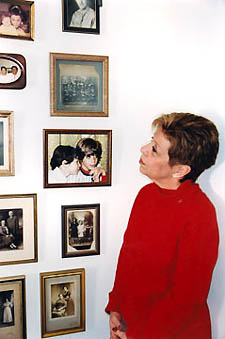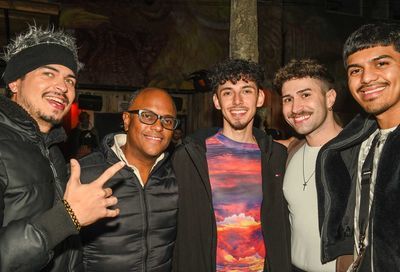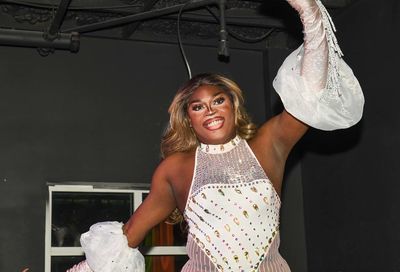Maternal Instinct
The Family Values of PFLAG's Sheron Rosen
Photography by Michael Wichita
 |
“Don’t let the elephants fool you, ” says Sheron Rosen, gesturing toward an array of pachyderm figurines standing in various parts of the living room. “They’re not political. We just like them. ”
It’s a stereotype that New York-bred Jewish mothers possess an off-the-cuff wit that is unique to them alone. Stereotype or not, Rosen fits the bill. And as President of the Metro D.C. chapter of Parents, Families and Friends of Lesbians and Gays — the largest PFLAG chapter in the world — it doesn’t hurt to have a sense of humor.
The organization holds its Sixth Annual Honors Gala on March 29, and will feature keynote speaker Alice Hoglan, mother of Mark Bingham, the gay passenger on Flight 93 who helped thwart that jet’s hijackers on September 11. Like most parents of gay and lesbian children, Hoglan found herself playing a role she hadn’t quite rehearsed for. Some parents of gay and lesbian children become unaffiliated activists simply by virtue of following their parental instincts.
This is what makes PFLAG such a juggernaut. As Rosen points out, it’s one of the strongest gay organizations in the world — partly because it’s not made up of gay and lesbian people at all. As part of the dominant majority, the straight allies that PFLAG consists of are in a better position to affect and influence America. As parents, they represent the cherished “family values ” that politicians love to extol.
When Rosen speaks, she sounds less like an activist and more like a mother defending her son. If the need for her own organization went away tomorrow, she would be thrilled.
“My hope would be that we wouldn’t even need a PFLAG, ” she says. “Then we could just move on and do some other good work. ”
METRO WEEKLY: Today you’re the president of the Metro D.C. PFLAG, but in the beginning you were just another parent trying to come to grips with your child’s sexuality. When did you first come in contact with PFLAG?
SHERON ROSEN: Back when Roger came out, my older son found an ad for the PFLAG Helpline in the Washington Post and saved it for me. I clipped it out, hid it in the back of the phone book and never called it. Shame was my overriding emotion, and I was worried that I would see someone I knew at the support group and I’d be outed. It wasn’t until later, after I had met some of my son’s friends and their families who were not so healthy and whole that I decided to volunteer with PFLAG. But to this day, I have never called the PFLAG Helpline or gone to the support group.
|
MW: How did Roger come out to you?
ROSEN: I was always still up at night when the kids got home from their dates. It wasn’t unusual for us to sit up until 4 a.m. drinking cocoa and talking. So Roger came home from a date with his English teacher’s daughter one night, and I sensed something peculiar. We were sitting right here at this table, and I said to him, “I have a feeling there’s a piece of you that I haven’t met yet. ” And he said, “There is, it’s horrible, and I need help, ” and that was all. Then he curled up into the fetal position on that couch and wouldn’t let me touch him. I started to cry, but mostly only because he was crying. I couldn’t stand his pain. It just cut me quickly. The following morning I flew to the pediatrician and told him to get me somebody.
MW: A psychiatrist?
ROSEN: Yes. I didn’t know what was wrong with Roger, but I wanted someone who wasn’t going to break him to fix him. He was quite whole, doing well in school, performing, popular. I wanted to deal with whatever the problem was, but not have him torn apart and rebuilt again. So we interviewed this psychiatrist who promised he would deal with whatever was wrong with Roger, but said that he couldn’t share it with us. His job was to get my son to tell us what was wrong, and within a month, he had done it.
MW: Did you ever seek therapy?
ROSEN: No. Remember, I was afraid someone would find out. And that was the worst part — the loneliness. Thinking I knew no one else who had a gay child, which I have since found out I actually did, but I didn’t know it because she was hiding too.
MW: How did your husband deal with it?
ROSEN: A lot better than I did. He was mostly concerned about Roger’s health. And then Roger’s brother was told while driving and almost drove right off Great Seneca Highway.
MW: You’re a close and accepting family. Why do kids who are part of such families think that coming out will be the one thing that will turn their families against them?
ROSEN: Because every day of his life, he absorbed the same message that everyone absorbs — that amorphous message that’s always floating in the air and you can’t tell where it comes from — that being gay is the absolute worst thing you can be. He was convinced that he was the lowest form of humanity, and so why would anyone want him around? And that’s the most heartbreaking part to me. If you know us, you know that we catch flies and let them go. You can see our birdfeeders, you can hear our dogs. We value life in this family. And so when I heard that he thought we’d put him out, I could hardly bear his pain.
MW: But you still had a very hard time with it.
ROSEN: Yes. Outside of Roger’s presence, I kept saying to my husband, “I will never stop crying. ” I thought I would cry for the rest of my life.
MW: How long was it before you started telling other people?
ROSEN: Well, it took Roger six years to tell my mother, and we waited until he told her because we didn’t feel comfortable having everyone around us know something she didn’t. Once he told her, we started telling others. But I’ll tell you this in retrospect: That may have been a legitimate reason or it may have been an excuse, but whichever it was, it bought me six years.
MW: Did you lose any friends as a result of coming out to them?
ROSEN: No, because thankfully we’ve chosen our friends wisely. My best friend was the last one I told, because she was the one I could least afford to lose. But I came to realize that if I lost her, she wasn’t a friend I wanted. And she was perfectly fine with it.
We did lose one family member because of [Roger and his partner Rick’s] wedding. One cousin, his wife, she’s Catholic, they refused to acknowledge or come to the wedding, even though they had met Rick and known Roger since birth. When they saw them, they gave each of them a kiss, but when it came to the wedding, it was “disgusting and immoral. ” And so they refused to come, and we’ve had minimal contact since.
MW: What is it about “gay ” that throws normally reasonable people like that all out of whack?
ROSEN: I think it’s the unknown. I know I originally had trouble with it because I was picturing bleakness, darkness, back alleys. But that’s the curious thing — I don’t think you would find many people who would tell you that they don’t know what gay is. Everyone thinks they know. As my neighbor once said, “It’s fear of the darkness, ” and then he told me to go turn on some lights.
MW: Some people talk about all the gay content in today’s media like that’s the answer to the problem.
ROSEN: I think for me, as I dwell on this over the years, that the lack of hearing about it sent a message. I came from a household of educated people. We had a library. And yet I never heard the word gay, never saw a book about it. And so I think what I got from that was that gay was verboten, even if that wasn’t the intended message. I remember growing up as a kid in New York, a very cosmopolitan place to grow up. The first time that I saw an interracial couple, I looked. It was just something I wasn’t used to seeing. I think the more exposure that the country has to gay people as part of our culture, the easier the path will be.
MW: I’m always surprised at how having a child come out is considered to be the ultimate shock for parents. Does it never even cross expectant parents’ minds that there’s a chance their child could be gay?
ROSEN: It’s not something that’s in their world. They’re two straight people producing a child, and they figure it will look like one or both of them, with light or dark hair, brown eyes or blue eyes, and that it will be straight. It certainly never crossed my mind. But I think, judging from some of our younger members, that that may no longer be so. Parents are becoming more aware that this is a possibility.
MW: With kids coming out at younger and younger ages, how is this changing the coming out process?
ROSEN: I think in general kids are developing and maturing earlier these days. They’re exposed to so much more via television and movies that it follows that they would discover their sexuality earlier. But whether that’s making it easier or harder, I don’t know.
MW: If Roger had come out to you at age twelve or thirteen, can you imagine how you would have reacted?
ROSEN: I can imagine that, but I have to go back into the head that didn’t know anything about any of this. We’ll call it my homosexual-ignorant head. That head would not have believed him if he told me at that age. I would have thought, he’s curious, he’s playing around, he questioning who he is and what he’s about. With my educated head, this many years later, if I had a twelve-year-old who told me, I would take it seriously.
|
MW: Does the PFLAG Helpline ever get calls from young kids, or mainly just adults?
ROSEN: Occasionally we’ll get calls from kids who are 14, 15, 17-years-old who are getting ready to come out, and that’s good because we can help them prepare. But remember, it’s a confidential help line. You don’t know the home they live in, you don’t know what kind of environment they’re walking into, and if you’re not careful, you can walk them right into danger. So we arm them with literature and all kinds of materials in case the parent is willing to look. I often suggest that they bring up a gay issue at the dinner table, maybe something that was in the paper, just to gauge the reaction. But the bottom line — as heartbreaking as it is — what we always, always tell them is hope for the best and prepare for the worst. Have someplace to go.
MW: Are some parents just a lost cause? If they absolutely will not listen to reason, can you do anything?
ROSEN: Probably not. There are some people out there who we are just not going to reach. If they’re willing to take that first baby step, to call or show up at a support group, then they probably will come around, but there are some people who will never take that step, and I’m sad for them. I find that people like that are boxed into a very tiny world with the doors closed and nobody gets in.
MW: Have you ever met a parent who you thought was intractable, that would never come around, and eventually they did?
ROSEN: No. Because if they get to the point where they’re talking to me, if they make that first call, if they take that baby step, then even if they’re weeping, you know that they love this child and will do anything to keep the communication open. We tell parents that they’ve called us so they can come to some educated conclusion about what’s just gone on in their lives. We feed back to them what they’re saying so they’ll hear themselves.
MW: If you never went through this process, how did you get to the point that you’re at today?
ROSEN: I went to the library, looked around to make sure no one could see what I was reading, and learned. I read propaganda, I read scientific journals. I even called Masters & Johnson and spoke to Dr. Masters. He suggested reparative therapy. Fortunately I was smart enough not to take his advice.
MW: How did you know not to do that? Just instinctively?
ROSEN: Because we’re a family that communicates. I told Roger from the beginning that no matter what I read or who I talked to, that he needed to be my primary resource. Because I can’t know about this. I’m not gay. And I needed to feel free enough to ask him about whatever crossed my mind.
MW: Do you still ask him questions?
ROSEN: The questions I ask him now are more marital, like do you have the proper documents prepared in case something should happen, since they’re not legally protected. The questions are less about who he is now.
MW: Is he involved with PFLAG?
ROSEN: No. He’s the only one in the family who’s not a member [Laughs]. I even got his husband’s mom to join the Ohio chapter. But the two of them, no. They figure they’ve done their part.
MW: It’s funny how PFLAG is one of the biggest and most influential gay organizations out there, and yet it’s for straight people, not gays. Why is PFLAG so powerful?
ROSEN: For exactly that reason. Because we’re straight. It’s a paradox, but our power comes from the fact that we’re perceived as the people next door. Nobody’s afraid to talk to us and no one has any preconceived notions about who we are.
 |
MW: Does that give you an in, politically?
ROSEN: It depends on what group you’re talking about. I think there’s a huge difference between activism and politics, and sometimes PFLAG will separate itself from the activism.
MW: Metro D.C. PFLAG is sort of exceptional. Not only is it the largest PFLAG chapter, but it’s wedged in between two states, one that some might consider fairly liberal and one that’s fairly conservative. How does this affect your work?
ROSEN: Well, it depends on where you’re talking about. There are seven chapters in Maryland, but ours encompasses Montgomery and Prince George’s Counties. Montgomery had antidiscrimination laws on the books before the state did, but then if you talk to some folks on the Eastern Shore, it’s an entirely different story.
MW: How about city versus suburb? Which is the better environment for gay youth?
ROSEN: It’s hard to say, but I do know that our Safe Schools initiative has gotten the school board and superintendent to put two books on this subject in every high school library in the city. So at least the administration, if not the student body, is aware of the problem.
MW: Do antidiscrimination laws that protect things like jobs and housing affect gay youth in any way?
ROSEN: We call gay kids in schools our invisible population, because they try to be invisible. They’re not going to raise their hands and say, “Don’t say that! I’m gay! ” So I think anything that makes it easier for them to be visible allows them to be more comfortable.
MW: A lot of politicians seem to use the “Save The Children ” platform for many political goals, and often those goals are detrimental to gays and lesbians.
ROSEN: It’s just another sound byte. All of these little sound bytes that sound so lovely about American family values which, as far as I can tell, don’t even really exist. The rate of divorce, cheating spouses, the Tailhook Scandal — most of these are straight offenses. And I believe that I am one of the rare living examples of your American family values: One husband for thirty-eight years, two kids, two dogs, two-car garage, the suburbs and a kid who’s gay. I’m it! And there are not a lot of me. It always strikes me that these politicians can stray from the marital path and it’s no big deal, and these are the same politicians telling us about family values. A lot of things don’t make sense to me.
MW: A lot of these PFLAG-type groups are spearheaded by moms. In the 1980s, Mothers Against Drunk Driving (MADD) was the big one.
ROSEN: Oh, yeah. Don’t touch that baby in that nest, because we’re ferocious. We make look gentle, but you go near that baby and we’ll bite your head off. [Laughs.]
MW: Do you think fathers often have more trouble accepting gay sons than mothers do?
ROSEN: I don’t really know. The dad’s the man of the house. He’s the breadwinner, the ballplayer. How could he have a gay son? Now I can tell you that that stereotype I just painted for you, well, my husband plays basketball three nights a week, lifts weights twice a week, jogs six miles every day, played touch football with both the boys growing up, took both kids to the gym with him, coached all the baseball teams, and he had a much easier time than I did at the beginning.
MW: Do you ever encounter that situation at PFLAG, where one parent is accepting and the other is not?
ROSEN: I was actually at a PFLAG support group about a year and a half ago. There was a couple there, and the mom was with PFLAG and the dad was with Parents and Friends of Ex-Gays (PFOX). They were divorced and the son lived in California. The wife had brought her husband to PFLAG to try to make him see some daylight. Their son was leading a successful life with a partner he’d had for years, and this father kept wanting to fix him. And the kid finally said, “I’m not broken, leave me alone. ” The father was trying to come to grips with why his son would not communicate with him anymore. He just couldn’t understand it. And afterwards, I walked him to the parking lot and I told him to ask himself every question he would ask of his son, and the answer would be the same. I think he was almost beginning to see the daylight, but I never saw him again and I have no idea what happened.
MW: How important is a strong family to gay children?
ROSEN: I think it’s vital. I think family support helps you in anything you do and anywhere you go. If you have a solid foundation, you can build a good house. If the foundation’s weak, the house is going to crumble.
|
MW: How about parents who don’t really accept their kids, but instead, go into this strange sort of denial where they interact amicably with their child but only by completely denying their sexuality?
ROSEN: For me, it wouldn’t be enough. If I were the child, I would feel tolerated. If that’s the best that child is going to get, and if the child can live comfortably with that, good. For me and my family, it wouldn’t work. I believe children deserve to be loved and accepted, not tolerated.
MW: Does your religion factor into all of this? Are you Jewish Orthodox, Conservative or Reform?
ROSEN: We’re, uh… we’re Conservative. [Laughs.] I mean, we do the major holidays. At Passover, we’ll eat matzo but we’ll also taste bread. I called the Rabbi that did Roger’s bar mitzvah to see if he would do Roger and Rick’s wedding, and I was very nervous. So he got on the phone and he said to me, “Do they love each other? ” And I said, “Yes. ” And he said, “Are they committed to each other? ” And I said, “Yes. ” And he said, “Then what’s the problem? ” And it was a beautiful wedding.
MW: So you were still made nervous by certain things even after fully accepting Roger?
ROSEN: Well, I’ll tell you a story. At the beginning of this long journey, every year they would tell me when Gay Pride was. June 8th, 9th, 10th — it’s usually sometime around then. And every year I would say, “Oh yeah, Herb and I will be there. ” And every year, wouldn’t you know it, I would have something so earth-shatteringly important to do that day that we couldn’t make it down there. It didn’t matter what it was, but it had to be done that day. Until I started questioning myself as to whether these were reasons or excuses. And I finally realized what I was afraid of. I was afraid that the press would be there. My picture could be in the paper, and then people I hadn’t told yet would know, and I’d have to deal with that.
But along the journey, as you make more and more choices, you finally get to this point: You. Don’t. Care. You start to know what’s important, and if you’re willing to take the journey, it’s a journey of betterment and growth and fulfillment. I’ve met people I otherwise never would have met and done work that I otherwise never would have done. My life is so much better and fuller now. I think I owe PFLAG more than I can ever give.
The Sixth Annual Metro D.C. PFLAG Honors Gala, celebrating the organization’s 20th Anniversary, will be held this Saturday, March 29, at the Hyatt Regency Capitol Hill. The evening will feature a keynote speech by Alice Hoglan, mother of Mark Bingham, and an appearance by Sharon Gless, who plays a PFLAG mother on Showtime’s Queer as Folk. Tickets are $125 for the dinner/dance or $225 for dinner/dance and pre-dinner reception. Call 202-338-6520 or visit www.pflagdc.org for more information on the gala. For more information on PFLAG, please visit the website, or write Metro DC PFLAG, P.O. box 66363, Washington, D.C. 20035. PFLAG’s Helpline can be reached at 301-439-FLAG (3524).
Support Metro Weekly’s Journalism
These are challenging times for news organizations. And yet it’s crucial we stay active and provide vital resources and information to both our local readers and the world. So won’t you please take a moment and consider supporting Metro Weekly with a membership? For as little as $5 a month, you can help ensure Metro Weekly magazine and MetroWeekly.com remain free, viable resources as we provide the best, most diverse, culturally-resonant LGBTQ coverage in both the D.C. region and around the world. Memberships come with exclusive perks and discounts, your own personal digital delivery of each week’s magazine (and an archive), access to our Member's Lounge when it launches this fall, and exclusive members-only items like Metro Weekly Membership Mugs and Tote Bags! Check out all our membership levels here and please join us today!























